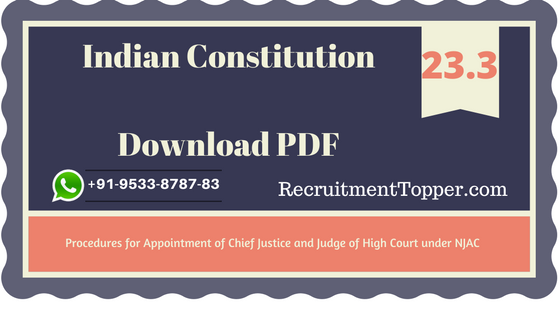Procedures for Appointment of Chief Justice and Judge of High Court under NJAC
For the appointment of the Chief Justice of a High Court under Section 6(1) of NJAC Act, the Commission shall recommend for appointment, a Judge of a High Court to be the Chief Justice of a High Court on the basis of inter seniority of High Court Judges and ability, merit and any other criteria of suitability as may be specified by regulations. For the appointment of other judges of a High Court, the Commission shall seek nomination u/s. 6(2) of NJAC Act, from the Chief Justice of the concerned High Court for the purpose of recommending for the appointment, a person to be a Judge of that High Court. The Commission shall also on the basis of ability, merit and any other criteria of suitability as may be specified by regulations, nominate name for appointment as a Judge of a High Court from amongst persons who are eligible to be appointed as such under clause (2) of Art. 217 of the Constitution and forward such names to the Chief Justice of the concerned High Court for its views. Before making any nomination under sub-section (2) of s. 6 or giving its views under sub-section (3) of s. 6, the Chief Justice of the concerned High Court shall consult two senior-most Judges of that High Court and such other Judges and eminent advocates of that High Court as may be specified by regulations. After receiving views and nomination under sub-sections (2) and (3), the Commission may recommend for appointment the person who is found suitable on the basis of ability, merit and any other criteria of suitability as may be specified by regulations. The Commission shall not recommend a person for appointment under this section if any two members of the Commission do not agree for such recommendation. The Commission shall elicit in writing the views of the Governor and the Chief Minister of the State concerned before making such recommendation in such manner as may be specified by regulations. The Commission may, by regulations, specify such other procedure and conditions for selection and appointment of a Chief Justice of a High Court and a Judge of a High Court as it may consider necessary.
Power of the President require reconsideration under NJAC
The President shall, on the recommendations made by the Commission, appoint the Chief Justice of India or a Judge of the to Supreme Court or, as the case may be, the Chief Justice of a High Court or the Judge of a High Court: Provided that the President may, if considers necessary, require the Commission to reconsider, either generally or otherwise, the recommendation made by it: Provided further that if the Commission makes a recommendation after reconsideration in accordance with the provisions contained in sections 5 or 6, the President shall make the appointment accordingly.
Earlier, judicial review would be available if the aforestated procedure prescribed is not followed or the appointee is found to lack eligibility.
A Judge of the High Court shall hold office until the age of 62 years.
Every Judge—permanent, additional or acting—may vacate his office earlier in any of the following ways—
(i) By resignation in writing addressed to the President.
(ii) By being appointed a Judge of the Supreme Court or being transferred to any other High Court, by the President.
(iii) By removal by the President on an address of both Houses of Parliament (supported by a majority of the total membership of that house and by the vote of not less than 2/3 of the members present), on the ground of proved misbehaviour or incapacity. The mode of removal of a Judge of the High Court shall thus be the same as that of a Judge of the Supreme Court, and both shall hold office during ‘good behaviour’ [Art. 217(1)]. This procedure is known as impeachment and is the same as that for a Judge of the Supreme Court. [For details, see Chap. 22 under, “Impeachment of a judge”.]
Salaries
A Judge of a High Court gets a salary of Rs. 80,000 per mensem while the Chief Justice gets Rs. 90,000 per mensem, He is also entitled to such allowances and rights in respect of leave and pension as Parliament may from time to time determine, but such allowances and rights cannot be varied by Parliament to the disadvantage of a judge after his appointment [Art. 221]
More Resources

